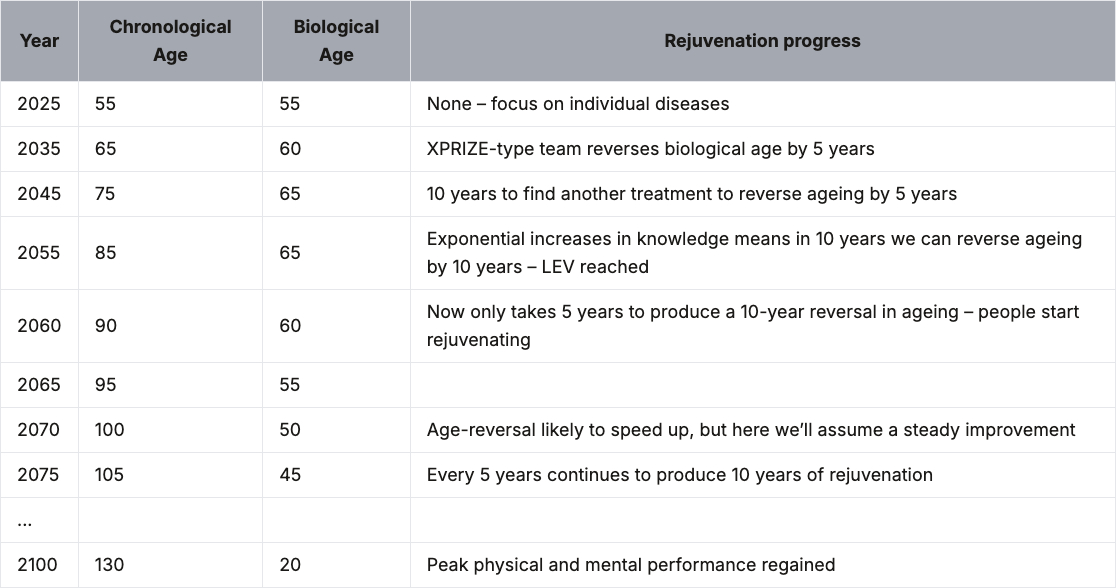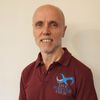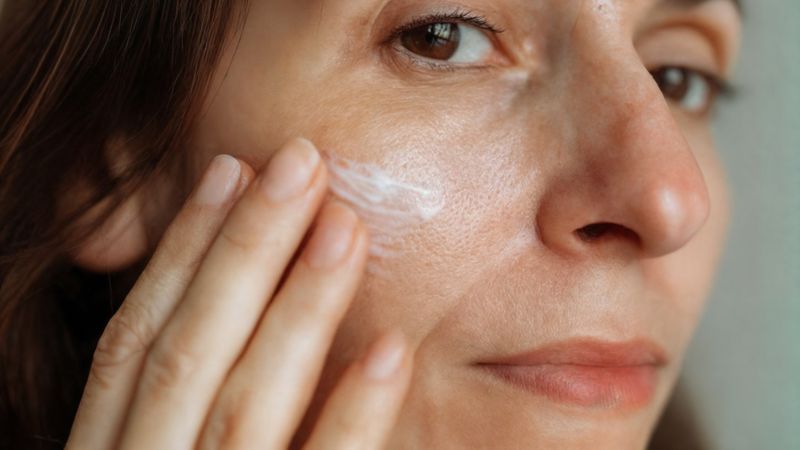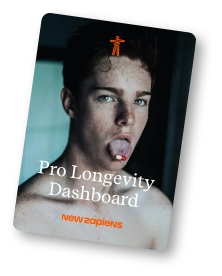Longevity Escape Velocity – living long enough to live forever

Can We Live Forever?
As a New Zapiens reader, you’re probably already interested in wellness, health, and longevity - making lifestyle choices to feel good today and hopefully live a longer, healthier life. But just how long could that be? Is it possible to live a radically longer life, maybe to live forever?
As the founder of the Live Forever Club, you may expect me to answer “yes!” with glee. However, my answer is a bit more nuanced than that – it’s “no, but you may be able to live long enough to live forever.”
Let’s break that down a bit. The initial “no” is because whatever you do today, whether you have the funds to monitor every biomarker and benefit from all of the latest therapies (like, say, Bryan Johnson) you’ll still be lucky to make it to 100, let alone break the record for maximum lifespan – currently held by Jeanne Calment who made it to 122 back in 1997.
However, eventually, it is inevitable that science and technology will beat nature at her own game. We’re barely a few centuries on from discovering the human cell and only understood how DNA was structured 70 years ago. Sequencing the first human genome was completed in 2003, having taken 13 years and almost three billion dollars – but now it can be done in under a day for a few hundred dollars. This, along with automated laboratories examining thousands of molecules at a time, means that our understanding of human biology, including ageing, is increasing exponentially. It is hard to imagine the depth of our knowledge in another 70 years, let alone 700 or 7,000 – so it’s not a matter of if, but when we will cure ageing.
Between the “no” and the “yes” comes the question, “can you live long enough to live forever?”.
You can’t live forever today.
We might not cure aging within your current remaining life expectancy.
But that doesn’t mean you won’t live forever, as long as you reach longevity escape velocity.
The Science Behind Longevity Escape Velocity
Hold on. What is longevity escape velocity (LEV)? This is the idea that to live indefinitely, your life expectancy needs to increase a year for every year that you live, with your anticipated death constantly being kicked further down the road. Roughly speaking, in the 20th century, life expectancy increased about 3 months for every year that you lived, so we’re a quarter of the way there already.
Let’s use a concrete example, me, to see what that means in practice. I’m in my mid-50s so I have a remaining life expectancy of about 30 years. I don’t think that ageing will be fully under control by the time I’m in my eighties but that doesn’t write off my chances of living forever. Why? Because therapies that slow, and even reverse, ageing will start arriving during those 30 years which will buy me more time for improved therapies to be developed, which buys me more time again, and on, and on, and on.
“Really?” I hear you ask. I understand, you may not have heard anything about the prospect of radical life extension except for some crazy billionaires and over-hyped podcasters.
But things are moving rapidly on the science and investment fronts, and that will only speed up as early positive results encourage the industry further. For example, the XPRIZE Foundation (which launched its first prize in 1996 to launch the private space industry) recently announced a $101 million healthspan prize to be awarded to any organization able to reverse biological age by 10 years. To win, a team has to take a group of 50- to 80-year-olds, treat them for a year, and make their muscle, cognitive, and immune functions act as if they were 10 years younger. This isn’t targeting a specific disease, but the underlying causes of ageing. Over 600 teams, including universities and biotech companies, have entered the competition, and 40 were recently selected to receive $250,000 each to help fund their efforts – so there are a lot of intelligent people out there who really think that this is possible.
And it is important that the XPRIZE Healthspan is targeting ageing because ageing increases the risk of all diseases. You may remember the covid curve showing the rapidly increasing risk of death from coronavirus infection the older you were – but this is the same for most age-related diseases too. Since the beginning of medicine, we’ve tried to tackle one disease at a time – but even if we cured cancer life expectancy would only increase by 2-3 years, because another age-related disease will pop up and kill you soon after that any way.
Ageing as the Root of All Disease
The better approach to allow us all to live longer, healthier lives is to repair the underlying damage caused by ageing. The drivers of ageing have been summarised in a highly cited research paper called the hallmarks of ageing. It described about a dozen biological processes that change with age – for example, shortening telomeres, mitochondrial dysfunction, cellular senescence, and stem cell exhaustion. It’s not necessary to understand what each of the hallmarks of ageing are, rather to know that there are plenty of scientists and companies developing treatments for each of them which will slowly allow us to stop ageing.
Going back to my chances of living forever, how do initiatives such XPRIZE Healthspan impact that? Well, let’s be a bit pessimistic for now, and assume nobody wins this time around, and it takes until 2035 (instead of 2030) to reverse aging by 5 years (instead of 10-20 years hoped by the organisers). So, in 2035, I’m now 65 and should have a remaining life expectancy of 20 years – but the XPRIZE winners have just bought me another 5 years by reversing my biological age by half a decade – meaning my remaining life expectancy is 25 years.
Maybe the initial therapies were the low hanging fruit of rejuvenation therapies, so it takes another 10 years to reverse my biological age by another 5 years. Now, in 2045, I’m chronologically 75 years old, but biologically 65 – with a remaining life expectancy of 20 years (rather than a mere 10 if nothing had changed).
With medical research closely bound to data and computing, it is following a Moore’s Law style exponential increase in productivity. By the mid-2040s, or perhaps even sooner if quantum computers have their day, many experiments will be carried out ‘in silico’ (using computer simulations and digital twins). So, it is very likely that in the following 10 years (2045-2055) the rate of progress will increase, and my life expectancy will increase by another 10 years – effectively stopping me ageing. And shortly afterwards, 10 years of age-reversal will take less than 10 years to develop, so I’ll start to be rejuvenated. By the end of this century, it may be possible to fully rejuvenate my body and brain to its peak health as if I was a 20-something again.
I’ll summarise all of that in a table…

How to Increase Your Chances
How can you make sure you live long enough to live forever? As usual, follow what your mother told you – good diet, exercise, sleep and relationships. Experiment with supplements (though study them carefully and use biomarkers to track their impact) and keep an eye out for evidence-backed early treatments (maybe red-light therapy is worth a try). Beyond that, one of the best things you can do is talk to others about the prospect of radical life extension.
Raising awareness of the potential to cure ageing will help kick people out of the death trance which assumes curing ageing is impossible (and generates crazy arguments like death gives life meaning) and encourage more investment into the longevity industry; if governments think their voters want to cure ageing then they’ll fund it more, and if investors think there is demand for true rejuvenation treatments then they’ll start putting in the billions of dollars that this is going to take.
Could I be wrong? Of course. Maybe reversing ageing is not inevitable, or just not on the timescales to save people alive today. But unless you have your hopes pinned on cryonics (preserving your body when you die hoping you can be reanimated in future) then what have you got to lose? 100,000 die of old age EVERY DAY – don’t let yourself become one of them.
References
Author: Adrian Cull
Founder of the Live Forever Club - promoting equality in longevity and raising awareness of radical life extension - https://liveforever.club




